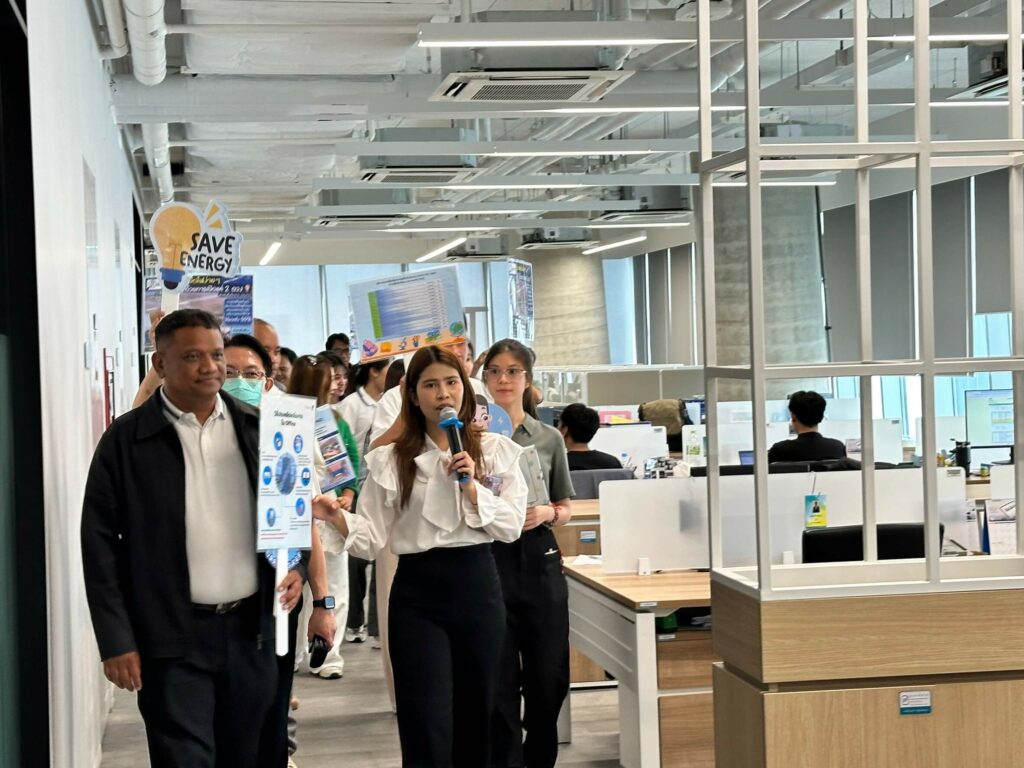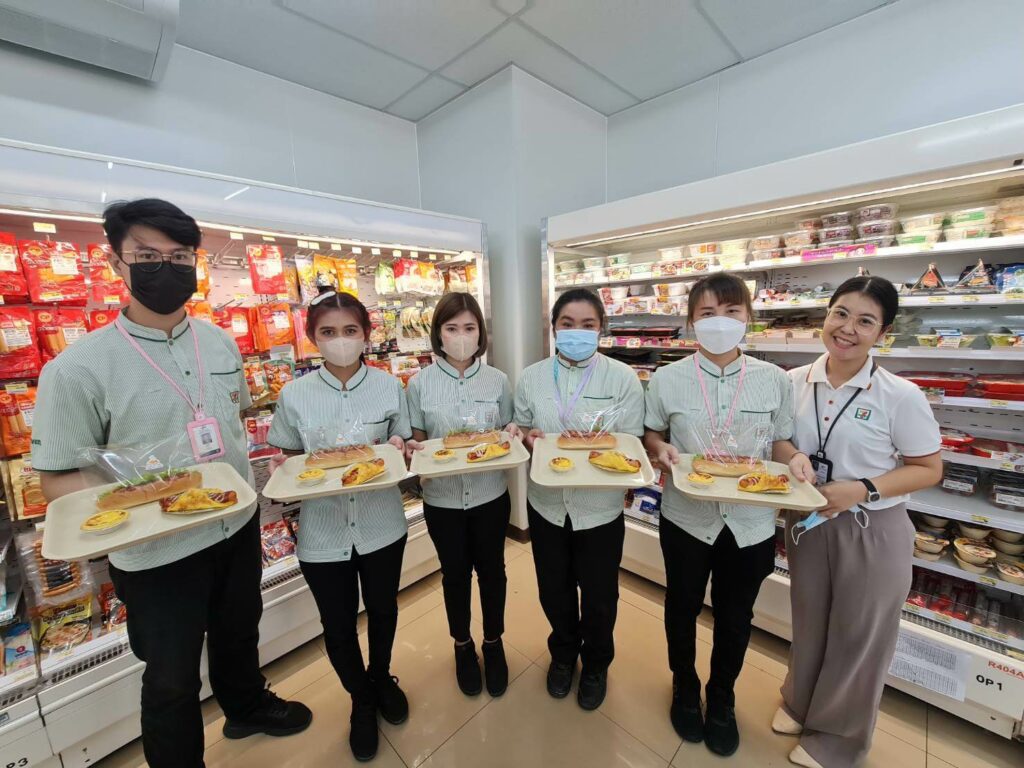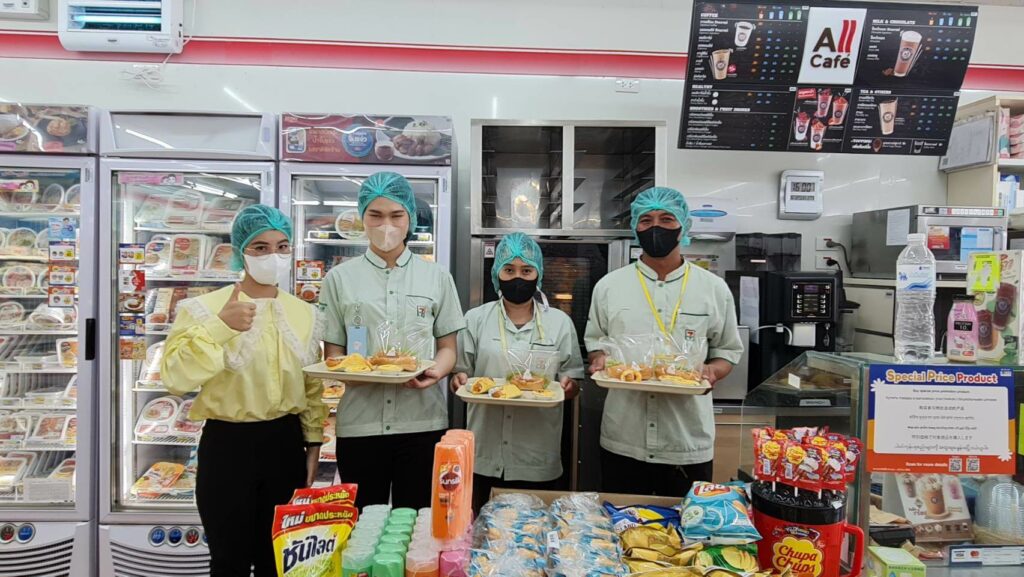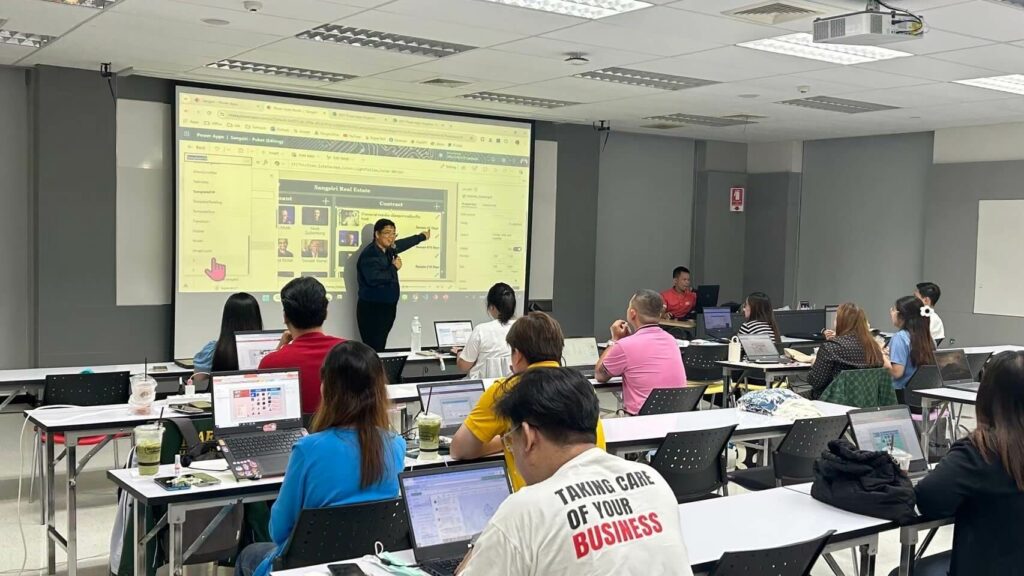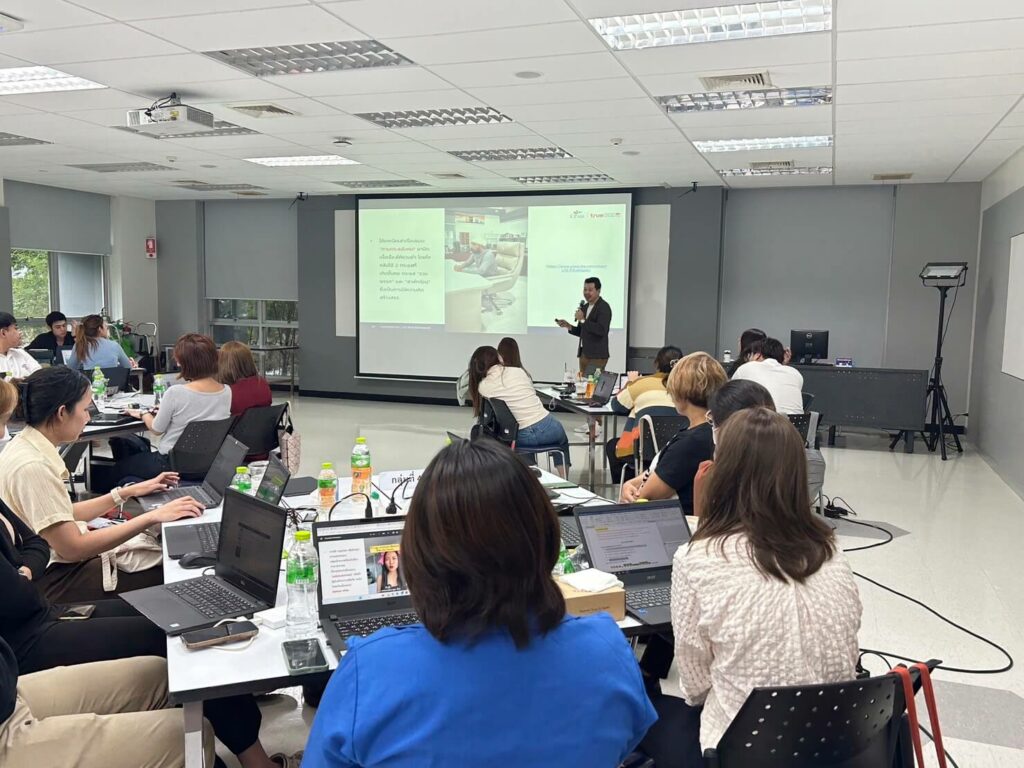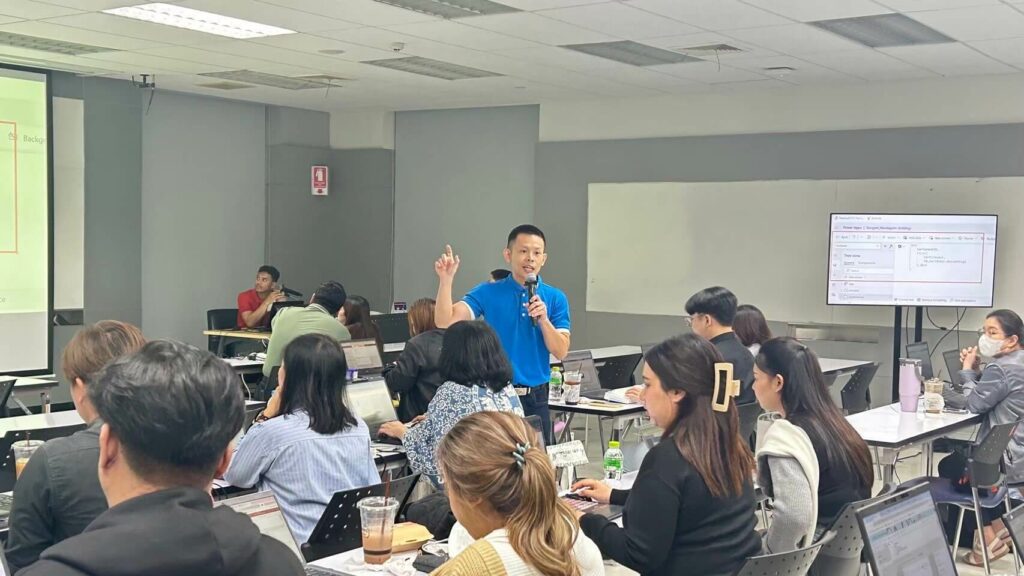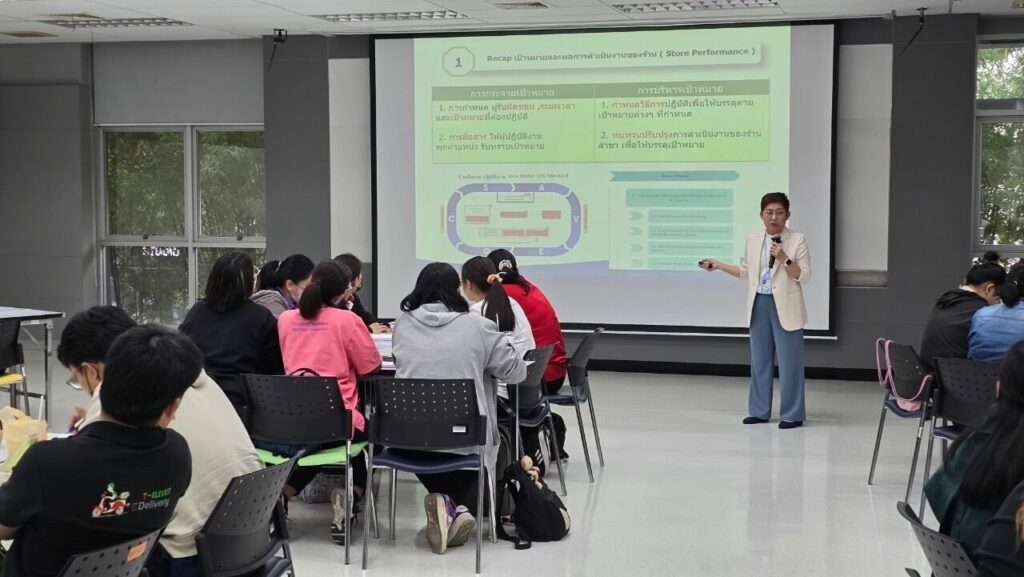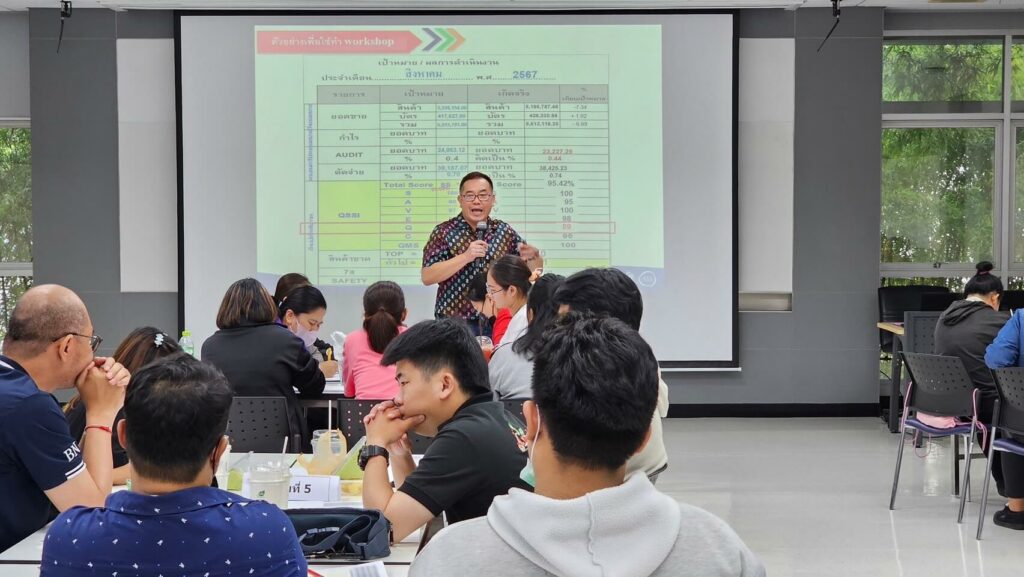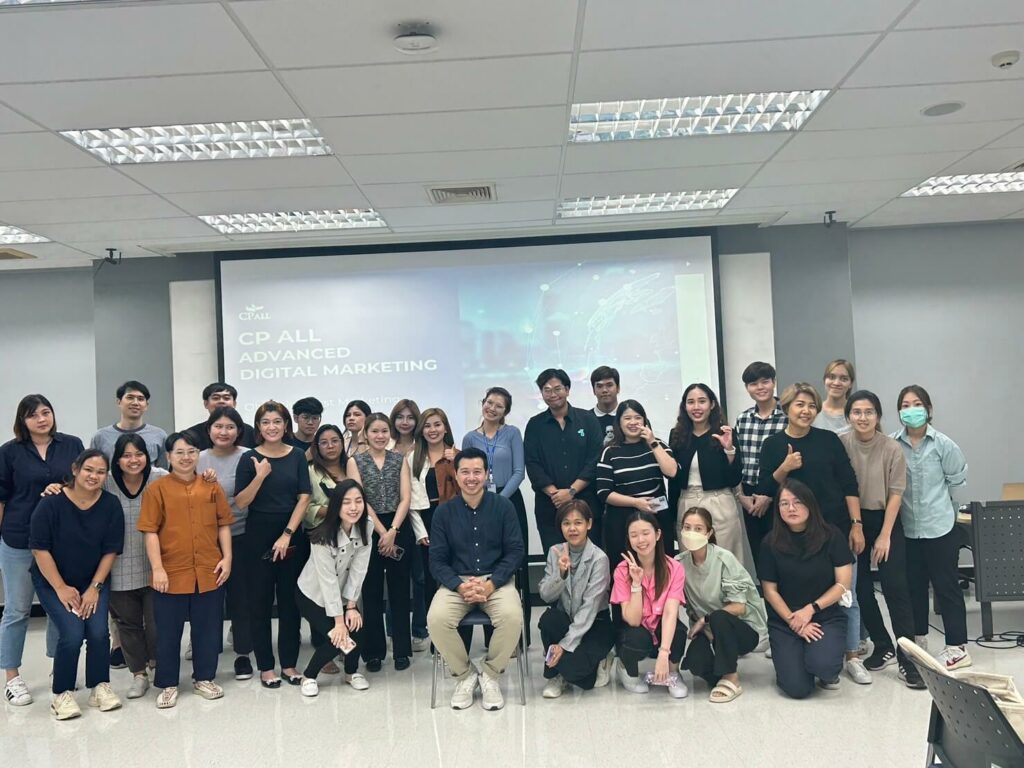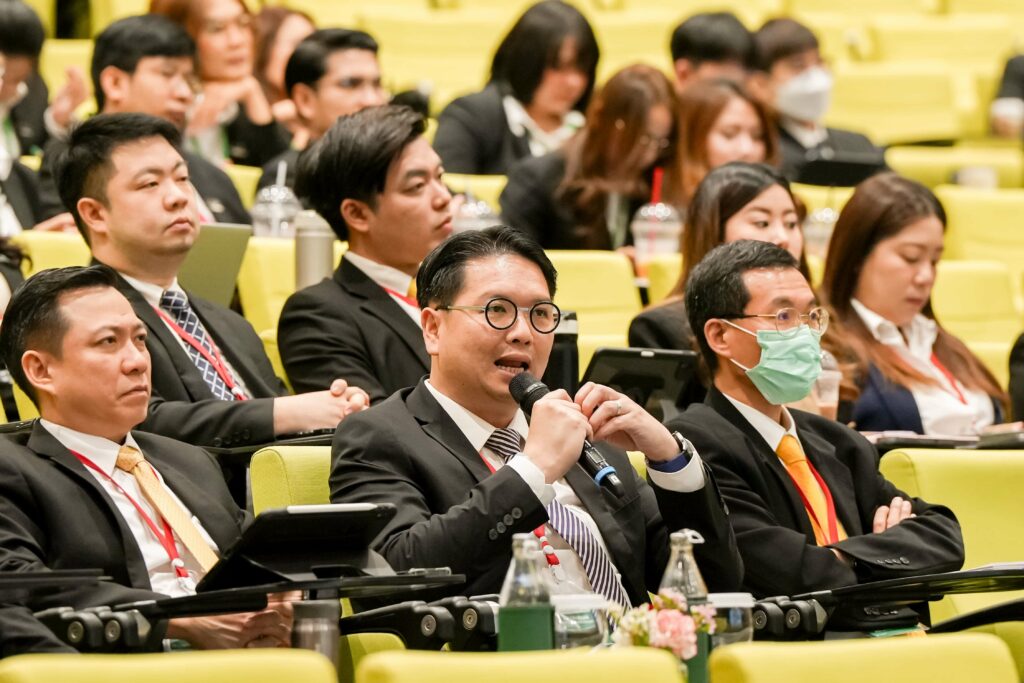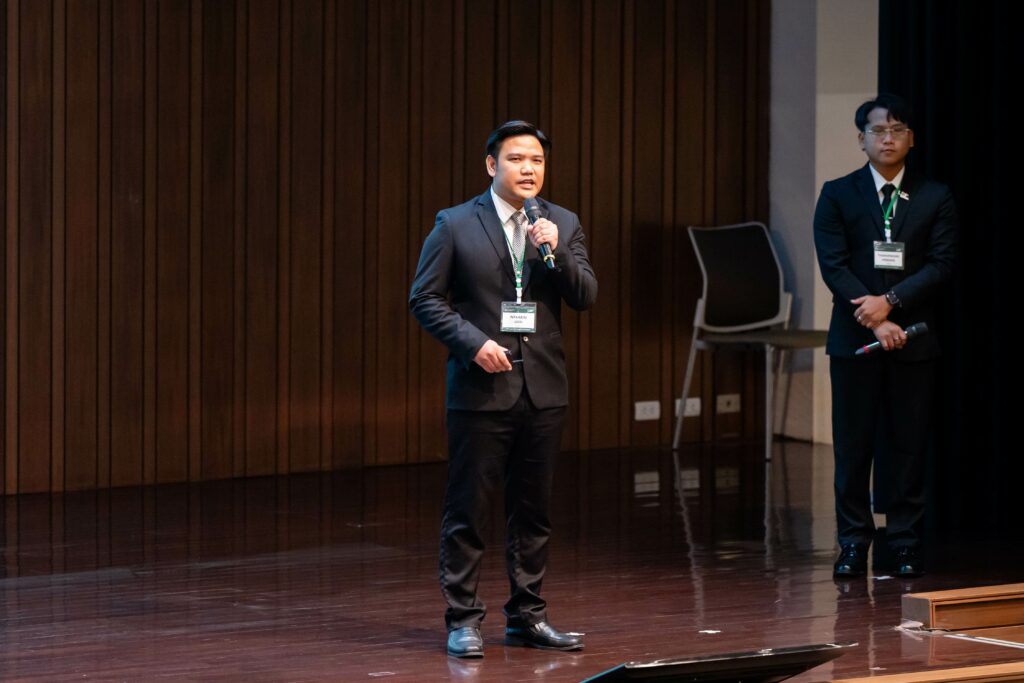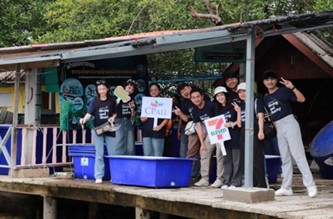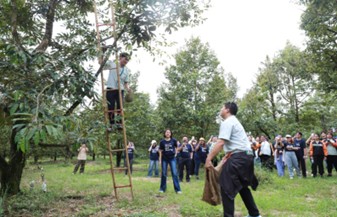Human Capital Development
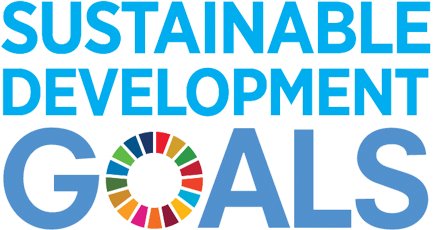
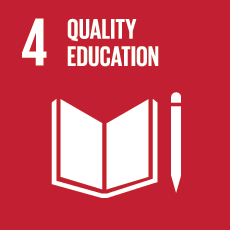
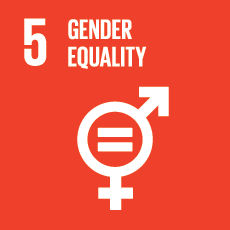
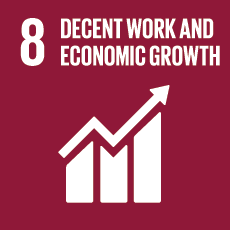
Key Performance in 2024
Average hours of training
of employees at all levels received “Environment” knowledge and awareness training
of employees at all levels received “Human Rights” knowledge and awareness training
of employees at all levels enrolled in the “Sustainable Organization Development (ESG)” course via e-Learning
Employees are knowledgeable in Science, Technology, Engineering and Mathematics or STEM
of job openings recruit employees internally
Key Progress in 2024

Develop sales and customer service skills among 7-Eleven store employees through the development programs “Own sales manager model for ALL Online, Signature Service”

Productivity Improvement Program for employees at all levels to increase work efficiency capacity

Organize training and assessments to ensure employee Digital Literacy and crucial skills comprising Analytic Skills, Automation Skills and Digital Marketing are at the Advanced level, in addition to operations enhancements via Power app & Power Automate

Provide knowledge and raise awareness regarding environmental issues, including efficient resources, energy, and water consumption across all employee levels through the 7S project

Supporting the SDGs

SDG 4 Ensure all persons have inclusive and equal access to quality education and support life-long learning opportunities
4.4 Increase the number of youth and adults who have relevant skills, including technical and vocational skills, for employment, decent jobs, and entrepreneurship

SDG 5 Achieve gender equality and empower women and girls
5.5 Ensure women’s full and effective participation and equal opportunities for leadership at all levels of decision-making

SDG 8 Achieve gender equality aPromote sustained, inclusive, and sustainable economic growth, full and productive employment, and decent work for allnd empower women and girls
8.2 Achieve higher levels of economic productivity through diversification, Technological-upgrading, and innovation, including through a focus on high-value added and labour-intensive sectors
Performance Against Goal
Results of the “Double Materiality Matrix”
Sustainability Dimensions
Impact level for application in business operations
Progress against Short-term and Long-Term Goals
All leaders and employees engage in the learning process and sustainability projects or activities annually
Performance Summary 2024
Average hours per FTE of training and development
Gender
Average amount spent per FTE on training and development
Age
Human Capital Return on Investment
Level
Employee Engagement Score
Nationality
Employees survey respondents
Categorized by the types of training
Risks and Opportunities
During the digital age where technological and business environments shift rapidly, resilient organizations succeed, and human resources remain key in managing changes for sustainable organizational growth. These changes require organizations to invest and focus on skills development, creativity and flexibility, as a means for effective adaptation, challenge management, and realization of benefits from new opportunities.
Emphasis is granted to principles of “Equality” in personnel development, granting everyone self-development opportunities to realize respective maximum potential in terms of aptitudes, knowledge, career growth, and vital skills for the future, including digital technology skills, critical thinking skills, data analysis skills, etc. This approach enables personnel to increase capabilities in adapting to rapid changes within the business sector and the creation of innovative solutions. Additionally, promoting operations efficiency in conjunction with employee participation in self-development and organizational development instills a feeling of ownership and increased commitment to respective duties.
However, if human capital development process lacks equality, this may lead to issues including discrimination, human rights violations, etc., which will impact organizational image, and long-term growth. As an approach to drive sustainable organizational growth, efficient human capital development must be ensured in combination with creating clear human capital development plans consistent with personnel capability, needs, and the regular evaluation of the aforementioned developmental milestones.
Management Approach
The Company aims to develop and manage human resources within the organization under the concept of “work succeeds, people are happy”, which focuses on outcomes and employee happiness throughout their professionallife within the organization, opportunities for opinion exchanges, engagement, and the promotion of equality and ethics. With the intention to instill consciousness and public service attitude within employee DNA, a mean for employees to achieve their full potential, the Company must establish an environment conducive towards learning and development. Emphasis towards the principle of “Equality” is iterated among employees to encourage opportunities for self-development in terms of skills, knowledge, and career advancement opportunities.
In 2024, the Company implemented strategic developments to reflect existing operational necessities through human capital training comprising various skills development programs dedicated to business alliance groups, Store Business Partners, and Sub Area stores. The various professional skills mentioned include uplift skills, organizational sustainability, personal data protection law, data analysis and digital literacy through learning methods consisting of Virtual Training, e-Learning, On the Job Training (OJT), Project Assignments, and Coaching & Mentoring, in addition to self-learning via organizational learning platforms, are designated to prepare employees for emergencies, crisis, and shifting situations in the future.
The Company continuously evaluates employee’s performance through engagement metrics utilizing guidelines for job satisfaction comprising employee goals, happiness, and stress. Evaluation results are integrated into employee development plans to ensure their knowledge and skills are relevant, with necessary operational knowledge, and capabilities to innovate. This approach grants employees work contentment, employee-company engagement, and resilience when confronted with changing business environments, thus increasing business operational efficiency.
Sustainable development framework for personnel skills and career opportunities

Course Structure Categorized According to Work Discipline

The Company emphasizes organization-wide personnel skill and knowledge development through encouraging executives and employees at all levels and disciplines to incorporate operational developments from corporate training programs. This approach improves and raises work efficiency and creates a learning culture for employees within the organization. In 2024, the Company implemented important actions as follows.
Skills Development and Career Opportunities for Contract and Part-Time Employees
Our company highly values and is committed to developing the potential of all employees, whether they are permanent, contract, or part-time staff. We therefore provide comprehensive and standardized training for these employees, as follows:
Skills Development and Raising Sustainability and Good Governance Awareness
The Company emphasizes organizational development through focusing on communication and increasing knowledge for employees at all levels, a means to increase employee risks and opportunities management capacity and support for business growth. In 2024, the Company provided new employees at all levels with knowledge on sustainability and good governance via the on-boarding process. Current employees received Refresher Training via e-Learning courses on sustainability and good governance or ESG Quiz to ensure up-to-date knowledge and skills. 100% of employees at all levels participated in post-training assessments to determine the level of knowledge and understanding with 100% successfully passing the assessment. Employees can also access sustainability and governance knowledge through the company portal, online seminar training, promotional activities including contests to conserve electricity within THE TARA office building and various learning media comprising videos, posters, mascots, etc.
Sustainability and Governance Course Contents (ESG Quiz)

Corporate governance and anti-corruption

Personal Data Protection Act (PDPA)

Cyber Security Awareness

Human rights and the business sector

Climate change
7S Environmental Training and Awareness Continuation Project
Objective:
To create understanding inclusive of creating employee participation in environmental conservation and efficient resource utilization.
Target Group:
Employees at all levels and areas including operations, product distribution, and office.
Progress:
Establish policies and campaign topics for 7S operations, focusing on efficient use of resources while reaping maximum benefits, nature conservation, reducing global warming impact, and maintenance of a pleasant environment according to the 1A3R principle: Avoid, Reduce, Reuse, and Recycle. Educational media was created to provide employees with guidelines in reducing electricity and water consumption, reducing material usage, and reducing and managing waste separation through the Company portal, promotional campaigns and activities, and various learning media inclusive of videos and posters. In 2024, 204,701 employees accounting for 100% of all full-time employees, participated in the awareness raising activity.
Develop Professional Skills and Growth
Ongoing Training: Program for ALL Online Sales Manager Model
The Company organizes “exemplary entrepreneurs” online training courses to develop operations and service skills of 7-Eleven store employees in response to customer behaviors and digital age changes. The training courses, which provide employees with knowledge and comprehension of product sales processes and technological literacy as tools to efficiently support sales and services. The training has been divided into 6 categories: 7-Eleven Delivery, ALL Online, TRUE, Coffee, and Bakery. In addition, processes have been implemented to raise “Able entrepreneurs” to “Skilled entrepreneurs” through rapid business expansion support to increase sales. This approach encourages employees to self-study content and receive evaluation for the 3 products: TRUE, ALL Online, Food & Beverage. In 2024, sustainable learning through “Exemplary entrepreneurs for ALL Online” has been further developed to include hands-on practice, sales team creation, sales figure evaluation and monitoring, ideas sharing to increase sales for all 7-Eleven stores through TKO Knowledge Sharing via the Company portal.
Impact and Benefits for employees

Employees participated in developing skills and techniques in product management and passed “Able Seller Entrepreneurs” competency assessments

Employees passed “Skilled Seller Entrepreneurs” competency assessment

Employees collectively passed “Exemplary entrepreneurs for ALL Online” competency assessment
Impact and Benefits for the organization

Upon enrolling in the “exemplary entrepreneurs” project, employees were able to generate an average of

An increase of when compared to the period prior to enrollment
Ongoing Project: Signature Service (Service Charm)
The Company enhances its practice and develops the skills of 7-Eleven store employees in line with customer needs and business strategies directed at heightened customer experience through impressive, prompt, complete and worthwhile offerings. In 2024, training conducted for FC (Field Consultants) consist of mentoring skills, coaching, and hands-on advising according to the 5 principles of “joint thinking, joint doing, helping, joint solving, jointly creating experiences” in addition to sincere communication. Additionally, a campaign to promote the best service according to “Signature Service Award” has been implemented and assessed according to 3 dimensions: customer service, team member care, and sales. Service etiquette expected among 7-Eleven store employees are determined and “catch-up” inspections to assist with implementation are conducted through CCTV cameras, manuals and learning media inclusive of posters promoting techniques in providing services to win hearts and increase sales. As a result, 2024 saw an 85% increase in the number of compliments from customers regarding in-store services and a 7% increase in compliments from delivery services.
Impact and Benefits

7-Eleven store employees have passed the services assessment

Employees have passed the Service Fan Club activity

FCs have completed the FC Service Coach 020 training course to promote services, team coaching skills, and complaint analysis skills

Customer satisfaction score in terms of service
Ongoing Project: Productivity Improvement
The Company encourages employees to advance work processes through integration of technology which increases personnel operational potential. A senior executive tasked with providing advice and elaborating various implementation techniques, including project progress and results monitoring, promotes the goal of continuous learning and collective development to increase the potential of executives and employees at all levels. The Company envisions this measure to increase capabilities for the delivery of quality products and services to customers and organizational management cost reduction through instilling awareness, concepts, attitudes, and hands-on learning processes (Active Learning). Participating employees gained the opportunity to practice analyzing, synthesizing, and exchanging opinions, in addition to Cross-Functional Team and TK (Tanpin Kanri) improvement experience. The mentioned small group improvement focused on improving minute aspects to raise work efficiency level in line with the organization’s NEXTSS strategy and promoted a culture of autonomous work improvement according to “4 Additions 1 Control”.
Impact and Benefits for employees

All target employees participated in the project

Reduction in working hours
Impact and Benefits for the organization

Increased income

Process efficiency increased

Reduced cost

Total value from improvements

Increase sales

Increase income

Increase profits

Increase productivity

Control costs
Developing Skills Critical for the Future
Ongoing Project: Employee Digital Mindset & Digital Literacy Development
The Company highlights the importance of continuously developing employees’ digital literacy abilities and thereby elevates office employee digital skills to the Intermediate level through the “Intermediate Digital Capability Development” course with skills assessment. Further developments in raising skill level from Intermediate to Advanced entails assessment of important skills as follows:
Impact and Benefits

A total employees participated in the training
Employees participated in Intermediate Digital Capacity Development
Employees participated in Data Analytic Upskilling for Business Strategy
113 Employees participated in Power App & Power Automate process development
Employees participated in Advanced Digital Marketing

Passed skills evaluation

113 projects developed through digital tools processing implemented into practice
Holistic Health & Well-being project
The Company promotes awareness raising among employees at all levels in the organization and emphasizes Holistic Life. The CP ALL Holistic Development Model concept focuses on employee creation of holistic balance composed of balancing physical health, mental health, social relationships, spiritual aspects, financial aspects, and career building, etc. to employee quality of life throughout professional life in the organization.
The Company simultaneously realizes the significance of employee care and retirement preparation through organizing training courses which provide relevant and necessary knowledge for employees of each age group to ensure an appropriate retirement transition. This ensures adaptation for their retirement years in society with tranquility. The Holistic Development course offered in 2024 includes the retirement life design course, mindfulness and self-reflection course, Happy Money & Happy Life course, Ikigai, seeds of happiness cultivation, and careers building. The courses are designed to provide holistic development, strengthen each life skill dimension, instill work-oriented encouragement and positive mindset, and disseminate techniques to ensure sustainable happiness through continuous training.
Impact and Benefits for employees

Employees participated in the training

Overall satisfaction in 2024
Leaders Development Program
CP ALL focuses on creating and developing leaders capable of managing businesses in times of changing global trends and technology through the Charoen Pokphand Group Leadership Development Course. This approach enables the development of knowledge and various critical skills utilized in managing organizational change, streamlining operations, increasing decision-making authority, as well as fostering cooperation within the group to increase efficiency and realize maximum benefits. Leadership developments are categorized as follows:

Senior Leaders Development Program
Focus on upskilling and developing CP ALL Group and Charoen Pokphand Group

Leaders Development Program
Develop operational leaders with focus on reforming operating operations

Potential Leaders Development Program
Train new generation of leaders with focus on business development

Future Leaders Development Program
For new leaders
The Company develops leaders through various learning processes including the following: Action Learning, coaching, workshops, guest speaker events, and online conferences. Program results are assessed in addition to providing participants with certificates to congratulate and encourage continuous self-improvement among personnel.
Impacts and Benefits

Employees participated in the Leaders Development Program in 2024

Projects have been implemented into practice

Income generated for the organization
Talent Management
The Company establishes guidelines for talent management through capacity assessment processes, Individual Development Plan (IDP) and group specific development projects which adhere to the 70:20:10 learning and development model. This approach promotes career advancement and reduce obstacles which may arise in developing and advancing employee careers.
Hands-on Training
Conducted through the Talent Pool development course and the Charoen Pokphand Group leadership development course
Learning through coaching and mentoring
Conducted through coaching and mentoring via various media including articles and videos from:
– Senior executives
– Direct supervisors
– Mentors
– Colleagues
– Specialists
Learning through various training course
Promote both intra- and inter-organizational learning, and self-studying via online system
Harmony Culture Program
CP ALL believes that organizational culture is the “lifeblood” that drives sustainable growth and long-term resilience. As such, the company prioritizes fostering a strong corporate culture known as the “Harmony Culture” — integrating similarities and embracing differences to create unity, akin to the harmony of a single orchestra. This culture is not merely aspirational rhetoric, but a lived practice adopted by more than 200,000 employees across the organization.
The “CCSF” operating principles build upon the Harmony culture to help the new generation understand and apply them in practice. It consists of: C: Clear – Communicate clearly, work collaboratively with mutual understanding, and set clear goals. C: Care – Show empathy, work together with understanding, recognize problems, and find friendly, cooperative solutions. S: Share – Provide a space for expressing ideas, showcasing talents, and exchanging positive stories. F: Fun – Engage wholeheartedly in internal or social activities with joy and enthusiasm, creating a shared sense of pride.
CP ALL delivers the “Harmony Power, CP ALL Power” training program to all employees and business partners. This program serves as a foundation to communicate and reinforce the company’s core cultural principles.
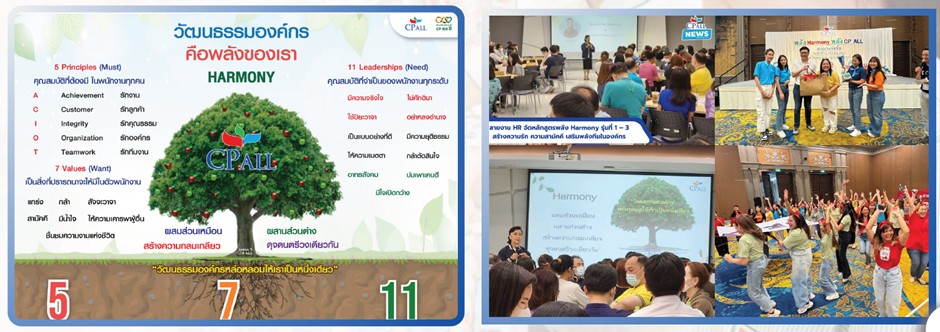
CP ALL organizes a series of inclusive and engaging activities that reinforce organizational values. These include:
1. ALL PRIDE Event: A platform that celebrates Diversity, Equity, and Inclusion (DEI), empowering employees to freely express themselves. This initiative is aligned with the Harmony Culture’s emphasis on equity and sustainable coexistence.
2. “Pa-Fin Pai-In Hai Khrob Thuk Scene” Activity: Designed to promote the CCSF values, this activity encourages employees and executives to co-create meaningful contributions to communities and society. It inspires pride and emotional connection by engaging employees in every “scene” of the organization’s journey — fostering a shared understanding and genuine societal impact.
3. “Jai Chueam Jai” (Heart to Heart) Activity: This initiative provides opportunities for employees and executives to build personal connections and strengthen interdepartmental relationships, enhancing team collaboration and trust
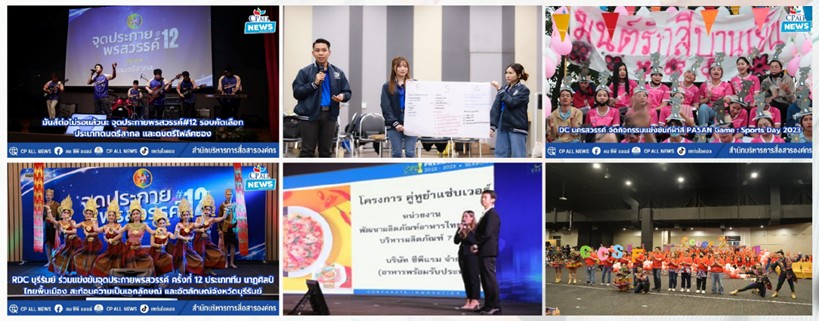
Type of Performance Appraisal
The Company adopts a performance management approach which focuses on Management by Objectives and Key Performance Index (KPI) categorized as Corporate KPI, Business Unit KPI, and Individual KPI. The performance, which is evaluated by direct supervisor, is interconnected between main operations and supplementary operations as a means of requiring all individuals to participate in achieving organizational goals.
In addition to managing performance as benchmarked by results, the Company utilizes multidimensional performance appraisal via 360-Degree Feedback to evaluate behavior and leadership abilities. By means of evaluating and collecting information from supervisors, colleague, subordinates, customers, a comprehensive image of employee performance is acquired. This assessment is crucial towards continuous employee self-development and development of the Company’s Performance Management System (PMS) capable of transparent and fair assessment while maintaining continuous and sustainable corporate-wide performance.
Components used by the Company to evaluate individual employee performance include:
1. Corporate KPI, Business Unit KPI, and Individual KPI
2. Indicators of individual work behavior towards the organization’s core values include:
Accept Change
Simplification
Innovation
Speed & Quality
Integrity & Honesty
Operations with consideration for the organization, people, and nation (3 Benefits)
3. Leadership Competency indicators include:
Ability to think
Ability to Communicate
Ability to Drive Results
Ability to work with others
In addition to Individual KPI, common Team Based KPIs will be considered upon initiation of team-based projects beyond normal responsibilities. Employees will receive evaluation for individual responsibilities and collaborative responsibilities in normal operations and projects beyond the normal duties scope in the form of Team-based performance appraisals.
The Company recognizes materiality in promoting and developing employee capability to enable the highest quality and efficiency performance. This is achieved though specifying clear guidelines for operations, inclusive of ongoing regular and continuous two-way communication throughout the year, Agile Conversations via All Perform Plus, team meetings, and feedback. The objective is to enable employees to perform respective operations and realize targets according to specified individual, departmental, and organizational goals consistent with stipulated vision, mission, values, and strategies.
In 2024, employees received performance appraisals through various formats as follows:
| Type of Performance Appraisal | Frequency | % of Appraised Employees |
|---|---|---|
| Management by Objectives appraisal conducted by direct supervisors | Quarterly | |
| Team-based appraisal conducted by supervisors and colleagues within the same project | Quarterly | |
| Multidimensional performance appraisal conducted by supervisors, co-workers, subordinates, and customers | Yearly | |
| Agile Conservation | Ongoing |
Employee engagement assessment
The Company values the opinions and suggestions of all employees. Therefore, Gallup Company Limited (Gallup) was assigned to perform employee engagement surveys consisting of 30 closed-end format questions to reflect employee opinion covering various dimensions as follows:
| Job satisfaction | Purpose | Happiness |
|---|---|---|
| Sample questions | ||
| At work, I have the opportunity to do what I do best every day | My company’s aim makes me feel like my work is important | There are some people at work who encourage my development efforts |
| At work, my opinion seems to have been listened to | In the past 6 months, someone at work has talked to me about my progress | At work, I have a best friend |
| Within the past year, I’ve had the opportunity to learn and thrive at work | ||
Investigating various factors which may induce employee stress remains key in assisting the Company to manage employee concerns more effectively and determine methods to increase employee happiness at work and professional engagement. By measuring the factors affecting employee “happiness and stress” stress levels can be assessed, stress causes can be identified, and methods to reduce stress while boosting morale and increasing happiness at work can be determined. According to the organization’s philosophy of “We want smiles from our customers with a happy team” both closed-ended and open-ended questions formulated are as follows:
| Degree of happiness | Degree of stress | Stressors of stress factors |
|---|---|---|
| Sample questions | ||
| How happy are you? | How stressed out are you? | What stresses you out the most – Work – Personal issues (finances, health, relationships, please specify) |
Survey results are analyzed to appropriately deploy human resource policies, strategies, guideline reviews and projects to enhance engagement with senior executives and engagement working group representatives from each business unit. In 2024, the Company organized an engagement promotion project to reduce employee stress. Examples of key projects include Harmony Bonding, a project to improve cross-agency and cross-department relationships, Performance Feedback project for employee recognition, environment improvement projects, and employee stress management projects. These projects aim to attract, retain and develop talented employees and foster employee engagement with the organization to achieve the Company’s established business goals.
Employee Engagement Enhancement Approach
Establish a CP ALL Group engagement committee
Human resource consultants for business units (HRBP) work with representatives to promote employee engagement in each unit, establish guidelines for key measurements relating to engagement and implement guidelines under PDCA principles, including reporting progress to the employee engagement working committee monthly until all units have been monitored
Conduct employee engagement surveys, both Pulse Survey and Full Survey, regularly to collect information crucial towards efficiently improving strategies and developing guidelines
Establish a CP ALL Group engagement committee
Business unit level executives are encouraged to uphold role model actions through implementing steps to improve employee engagement as follows:
Assign executives with outstanding comprehension and communication skills to instill other executives with positive energy to promote employee engagement building through suitable activities
Regularly monitor progress according to engagement plans and provide advice to improve operating procedure efficiency
Establish an atmosphere for all executives and employees according to the organizational culture of Harmony (5-7-11) and CCSP: Clear Care Share Pun, which promotes happiness and success while working together
From implementing the above actions in 2024, the employee engagement score increased from 91% to 93%, a value which exceeds the target, and employee stress levels have decreased to 25.12.
Long-Term Incentives for Employee (LTIs) program
The Company has designed an effective long-term incentive program with the objective to attract and retain employees, as well as talent executives with notable achievements to continue working with the Company in the long term. It also helps employees feel more ownership of the Company and motivates them to work hard to achieve the company’s goals. The Company has therefore implemented 2 performance incentive formats as follows:
Performance Shares
Stocks provided to employees with at least 3 years of service (under the top management position) can exercise their shares to receive profits after the 3-year period as specified by the Company or hold stocks to create long-term returns. In 2024, the 76% of employees below senior management level participated in the program
Performance-based cash
Special bonuses given to employees at an amount corresponding to employee performance and Company performance in achieving overall long-term targets including environmental goals. The mentioned goals aim at driving low carbon neutrality by 2030. Stocks are including the engagement of over 80% of all stakeholder groups by 2030
Corporates KPIs success metrics linked to the Long-Term Incentive for Employees
| Types | Dimension | KPI |
|---|---|---|
| Business Performance | Profitability |
|
| Sustainability Performance | Environmental | Energy Efficiency (Reduction) -25% vs BAU” by 2030 |
| Social | Stakeholder Engagement >80% by 2030 | |
| Governance | The Company’s corporate governance rating is at excellence (by an internationally recognized institute) |
*BAU = Business as Usual
To ensure the company’s long-term goals and strategy are achieved, starting from the baseline year of 2021, the company has deployed a long-term incentive program for employees who perform towards corporate achievements within a 5-year period. This Is a key milestone towards achievements of corporate business and sustainability targets. The program involves annual monitoring and evaluation of employee performance and progress against these targets. The operational targets are individually tailored for each operation to ensure alignment with our principal company-wide targets, and each operation has assigned levels of achievement against the specific goals to the task force.
The average coefficient of special bonuses related to performance-based compensation for employees below the senior management level varies between O% and 180%, depending on the company’s performance, such as sales, number of branches, customer satisfaction, employee engagement, corporate image, and the level of achievement against the long-term goals set by the company.
Employees below the senior management level (from department manager or equivalent to general manager or equivalent) participate in the long-term incentive program at a rate of 10%.
Employee Retirement Plan Project
Retirement is an important transition period in every employee’s life, thus preparations for retirement is necessary towards smooth transition and adaptability for both the employee and organization. In 2024, the Company prepared employees for retirement by inviting experts to provide knowledge and advice regarding financial planning upon retirement, which covers investment, debt management, health care and insurance through online training. In addition, the Company assist employees in the event of termination or support continued employment post employee retirement through providing financial benefits and welfare, medical allowances, the establishment of a retiree club and opportunities to become 7-Eleven store owners or employment as Company consultants. In 2024, a total of 20 retired employees were rehired as consultants.
Impact and Benefits

Employees participated in the pre-retirement preparation program

Retired employees continued their employment
Reward and Recognition Program
To strengthen employee engagement and create an atmosphere of strong relationships between departments, colleagues and supervisors, the Company has implemented various projects including: Reward & Recognition program, the New Employee Meets Executives Project (elder sibling meets younger sibling) to create familiarity and connections between new employees and executives, the Im Yok Gaeng Taeng Yok Project to promote good relationships through joint activities, the Happy Survey project to monitor and develop employee satisfaction and the Hall of Fame project to honor employees with outstanding contributions and notable deeds for the organization. In addition, the Company emphasizes managing compensation and welfare of employees at all levels appropriately and continuously. The established policy allows for annual salary adjustments to attract and retain quality personnel and promote sustainable bonding between employees and the organization.
Other Information
Human Capital Return on Investment (HCROI)
| Unit | 2021 | 2022 | 2023 | 2024 | |
|---|---|---|---|---|---|
| a) Total Revenue | THB | 587,529,718,793 | 852,605,218,842 | 921,187,099,370 | 987,793,941,427 |
| b) Total Operating Expences | THB | 116,866,861,572 | 165,413,878,985 | 179,911,512,903 | 194.588,354,688 |
| c) Total Employee-Related Expenses (Salaries+Benefits) | THB | 41,841,000,000 | 61,862,000,000 | 68,328,000,000 | 75,167,000,000 |
| Resulting HCROI | Equal | 12.25 | 12.11 | 11.85 | 11.55 |

